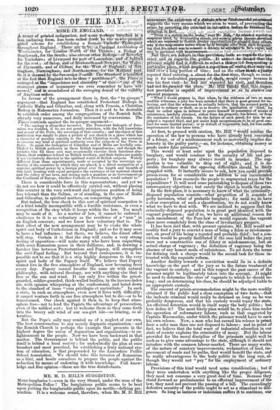TOPICS 0-F:1-1,11AL ,jog edT ItQMKI N MIMI/ANN " 03 aallimaa Marg,
A IsuitST of printed indignation, andssonfil-ferlfat%i' tligl *EN
less ms
e*dining. form; ,li..bOtiscalad.fcirtlily... two* g teil scheme for establishing a Romahr..seithdli throughout England. There Arg to 1)---7-p.ragi,wil Archbishop of Westminster, foil-I:Oak /AM 4-"thi filibidea; la Bisbom Southwark, trot the Mouth ;.' alsoaeltivaniatglt
for Xorltkilureu. of Liverpool iiiiptultdoMait • if lorthe,reatt.e0Salap, autlLof.Metionithquitl
of .PlYlkienthariand Of.Alliftun4 fearthbrMftilit 411-4;htiaflkaPiaIlligninglisma and! Ifeith net .;r. ,,.'dfl Nr: : .• Pe.iti$ 4443101.4 tilii &were* rP o : 1,. at Vie fad *sit. Inglandsia tote thIrsq` ; Viah'/ outraged .*Via," impudennti And atisitrdity"litithirla, th
-strangest,pivens. -of ,mummery • we rtIttsiiiber
Aimed," aug1;_ijr,aaandalized at the sweeping denial of the validity of A oglioast-vithers. In favour of the arrangement there is, first, the " to vogue " - argument—that England has established Protestant Bishops in Catholic Malta and Gibraltar, and, along with Prussia, a Christian Bishop in Mahometan Jerusalem. Then it is said to be desirable - to establish order among the congregations of the Romish faith, already very numerous, and daily increased by conversions. The Times contends against the tu-quoque argument-
" The analogy is altogether incorrect. The Protestant bishopric of Jeru- salem was founded, if we are not greatly mistaken, with the full knowledge
and assent of the Porte, the sovereign of that country ; and the object of that -institution was simply to place a prelate of our church in a place. which has a character of peculiar sanctity to the whole Christian world not certainly to exercise any kind of spiritual authority the subjects of the Porte in
Syria. So again the bishoprics of Gi and of Malta are lawfully esta-
blished by British authority in those British dependencies; and though the prelates who fill those sees may occasionally exercise their functions else- where, their residence is fixed on British territory, and their duties are mainly if not exclusively directed to the spiritual wants of British subjects. Widely different from these appointments, made or accepted by the sovereign au- thority of the countries in which they are placed, is a direct usurpation of a supreme spiritual power by a foreign priest over the length and breadth of this land, treating with equal arrogance the existence of our national church and the policy of our laws, and issuing such a mandate as no Government= the Continent of Europe, whether Catholic or Protestant, would submit to."
There is considerable force in this representation; and yet we -do not see how it could be effectively carried out, without placing this country in the very awkward and injurious position of being less tolerant than the Sultan, or of standing, in the case of Malta and Gibraltar, in spiritual matters, on conquering rights. But indeed, the true cheek to this sort of spiritual usurpation is of a kind totally incompatible with a forcible resistance, or even a recognition of the step while it keeps within the law. Too much may be made of it. As a matter of law, it cannot be enforced : obedience to it is as voluntary as the residence of a "nun" in an English convent; and we know how voluntary that is. The first effect of the new arrangement may be to evoke the whole
. spirit and body of Catholicism in England ; and so far it may seem to have a bad influence : but there, we believe, the direct effect will stop. Certain it is that the step will excite a very strong feeling of opposition—will make many who have been coquetting -.with semi-Romanism pause in their dalliance, and, in drawing a ' harsher line between Protestantism and Papacy, will strengthen
the anti-Papal feeling. But beyond that consequence, it is im- possible not to see that it is a step high) E dangerous to the very spirit and body of the Papacy itself. We believe that Popery cannot live in the-free atmosphere of England, now becoming freer every day. Popery cannot breathe the same air with natural philosophy, with natural theology, nor with anything else that is free as the sun and wind. It can only live within the priest- guarded, soldier-guarded, thick-walled basilica, in the incense-laden air, with opinion whispering at the confessional, and bated down to the standard of issue " cum privilegio et auctoritate." In such a state, in such an atmosphere, even now it lives with difficulty: it cannot venture forth in our free atmosphere but to die—or to transformed. Our check against it then is, to keep that atmo- sphere free—not to lend the Papists the advantage of persecution, even of the mildest sort ; but to welcome them as they come forth into the breezy salt wind of our sea-girt isle—so bracing, so al- terative.
But the Pope's sally may remind us of a neglect of our own.
The best counteraction to any merely dogmatic organization—and the Romish Church is perhaps the example that presents in the highest degree the union of dogmatism and organization—is en- lightenment in the people. Now we have been backward in that matter. The Government is behind the public, and the public itself is behind a local society ; for undoubtedly the plan at once broadest and most practical, for establishing a truly. national sys- tem of education, is that propounded by the Lancashire Public School Association. We should take this invasion of Romanism as a hint, and bestir ourselves to prepare the people against the seduction by means of endowing it with knowledge. Full know- ledge and free opinion—those are the true disinfectants;


























 Previous page
Previous page